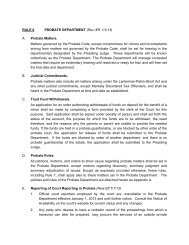download - Contra Costa County Bar Association
download - Contra Costa County Bar Association
download - Contra Costa County Bar Association
Create successful ePaper yourself
Turn your PDF publications into a flip-book with our unique Google optimized e-Paper software.
Domestic Partner Coverage Rights Under<br />
the California Insurance Equality Act<br />
by Ralph L. Jacobson<br />
GJEL Accident Attorneys<br />
Under California law, registered<br />
domestic partners<br />
are “two adults who<br />
have chosen to share one<br />
another’s lives in an intimate and<br />
committed relationship.” 1 The California<br />
Domestic Partner Rights and<br />
Responsibilities Act of 2003 required<br />
that registered domestic partners be<br />
provided the same rights, protections<br />
and benefits as spouses; and<br />
that they also be subject to the same<br />
responsibilities, obligations and duties<br />
under law. 2<br />
One year later, the California Insurance<br />
Equality Act 3 (hereafter referred<br />
to as The Equality Act) was<br />
enacted to mandate that insurance<br />
policies governed by the law provided<br />
coverage for the domestic<br />
partner equal to that provided for<br />
the spouse of an insured. It states:<br />
(a) Every policy issued, amended,<br />
delivered, or renewed in this state<br />
shall provide coverage for the<br />
registered domestic partner of an<br />
insured or policyholder that is<br />
equal to, and subject to the same<br />
terms and conditions as, the coverage<br />
provided to a spouse of an<br />
insured or policyholder. A policy<br />
may not offer or provide coverage<br />
for a registered domestic partner if<br />
it is not equal to the coverage provided<br />
for the spouse of an insured<br />
or policyholder. This subdivision<br />
applies to all forms of insurance<br />
regulated by this code.<br />
(b) A policy subject to this section<br />
that is issued…shall be deemed<br />
to provide coverage for registered<br />
domestic partners that is equal to<br />
the coverage provided to a spouse<br />
of an insured or policyholder.<br />
(c) It is the intent of the Legislature<br />
that, for purposes of this section,<br />
“terms,” “conditions” and<br />
“coverage” do not include instances<br />
of differential treatment<br />
of domestic partners and spouses<br />
under federal law.<br />
The Equality Act also amended<br />
Insurance Code Section 10121.7, regarding<br />
group health insurance, to<br />
read:<br />
“A policy of group health insurance<br />
that provides hospital, medical,<br />
or surgical expense benefits<br />
shall provide equal coverage to employers<br />
or guaranteed associations,<br />
as defined in Section 10700, for the<br />
registered domestic partner of an<br />
employee, insured, or policyholder<br />
to the same extent, and subject to<br />
the same terms and conditions, as<br />
provided to a spouse of the employee,<br />
insured, or policyholder, and<br />
shall inform employers and guaranteed<br />
associations of this coverage. A<br />
policy may not offer or provide coverage<br />
for a registered domestic partner<br />
that is not equal to the coverage<br />
provided to the spouse of an employee,<br />
insured, or policyholder.”<br />
Prior law had required group<br />
health care insurance plans and<br />
policies of group disability insurance<br />
to offer coverage for the domestic<br />
partner of an employee or<br />
insured to the same extent as coverage<br />
provided to a dependent. 4 That<br />
statute was amended by the Equality<br />
Act as well. This prior definition<br />
seemed to be at odds with the statutory<br />
definition of dependent, which<br />
was:<br />
“’Dependent’ means the spouse<br />
or child of an eligible employee,<br />
subject to applicable terms of the<br />
health benefit plan covering the<br />
employee...” 5<br />
On its face, this definition did not<br />
seem to include the domestic partner,<br />
leaving ambiguity.<br />
Prior to adoption of the Equality<br />
Act, there were also gray areas<br />
as to the contractual standard of<br />
what constituted a dependent in a<br />
health insurance contract. Most revealing<br />
in that regard is Prudential<br />
Ins. Co. of America, Inc. v. Superior<br />
Court, 6 which concerned whether<br />
or not a college student daughter of<br />
an insured was, or was not, a qualified<br />
dependent under her parents’<br />
health insurance policy at the time<br />
she suffered catastrophic injuries.<br />
Under the policy, qualified dependent<br />
status was defined to include<br />
children of the insured over the age<br />
of 18 who were full-time students.<br />
In this case, the insured’s daughter<br />
had chosen not to enroll in school<br />
for the quarter following her freshman<br />
year due to personal problems,<br />
but she had retained the right to<br />
seek re-admission. Evidence from<br />
the school indicated that this was<br />
not an unusual circumstance; and<br />
the parents and student asserted<br />
she should be deemed a qualified<br />
26<br />
MARCH 2013
















